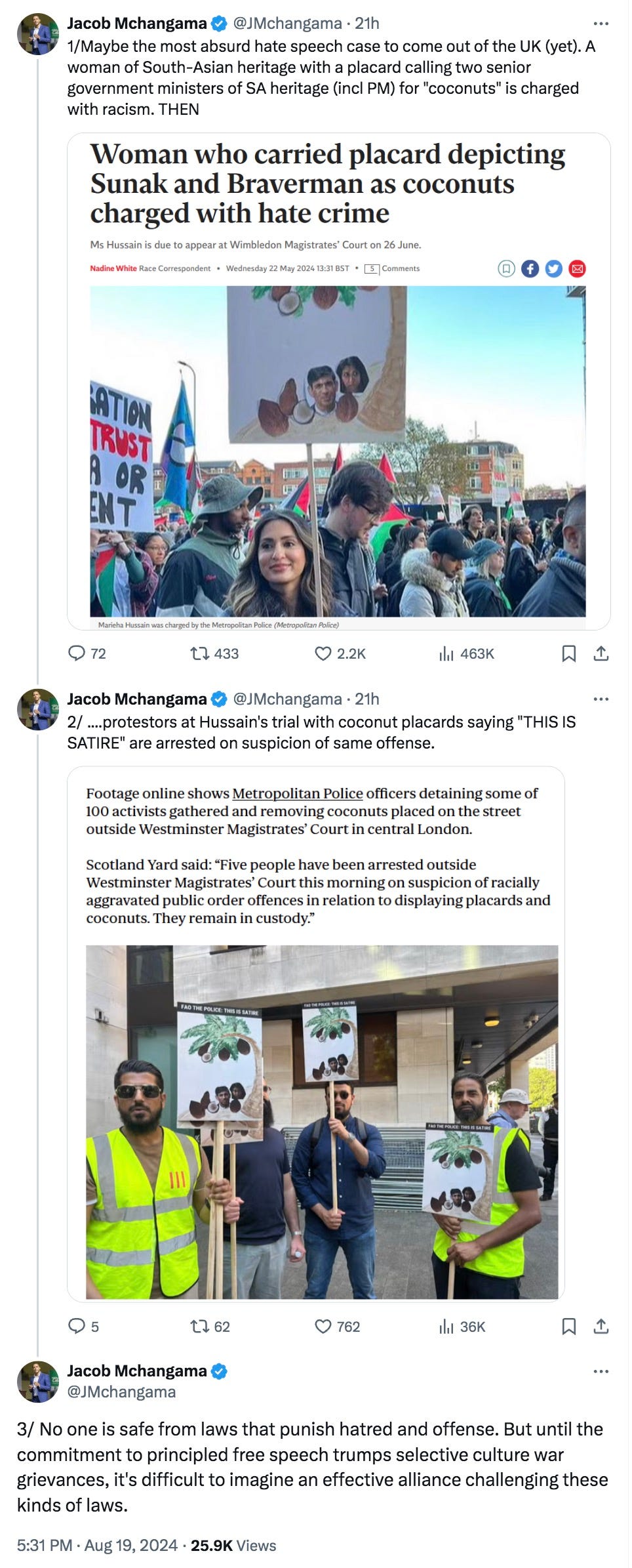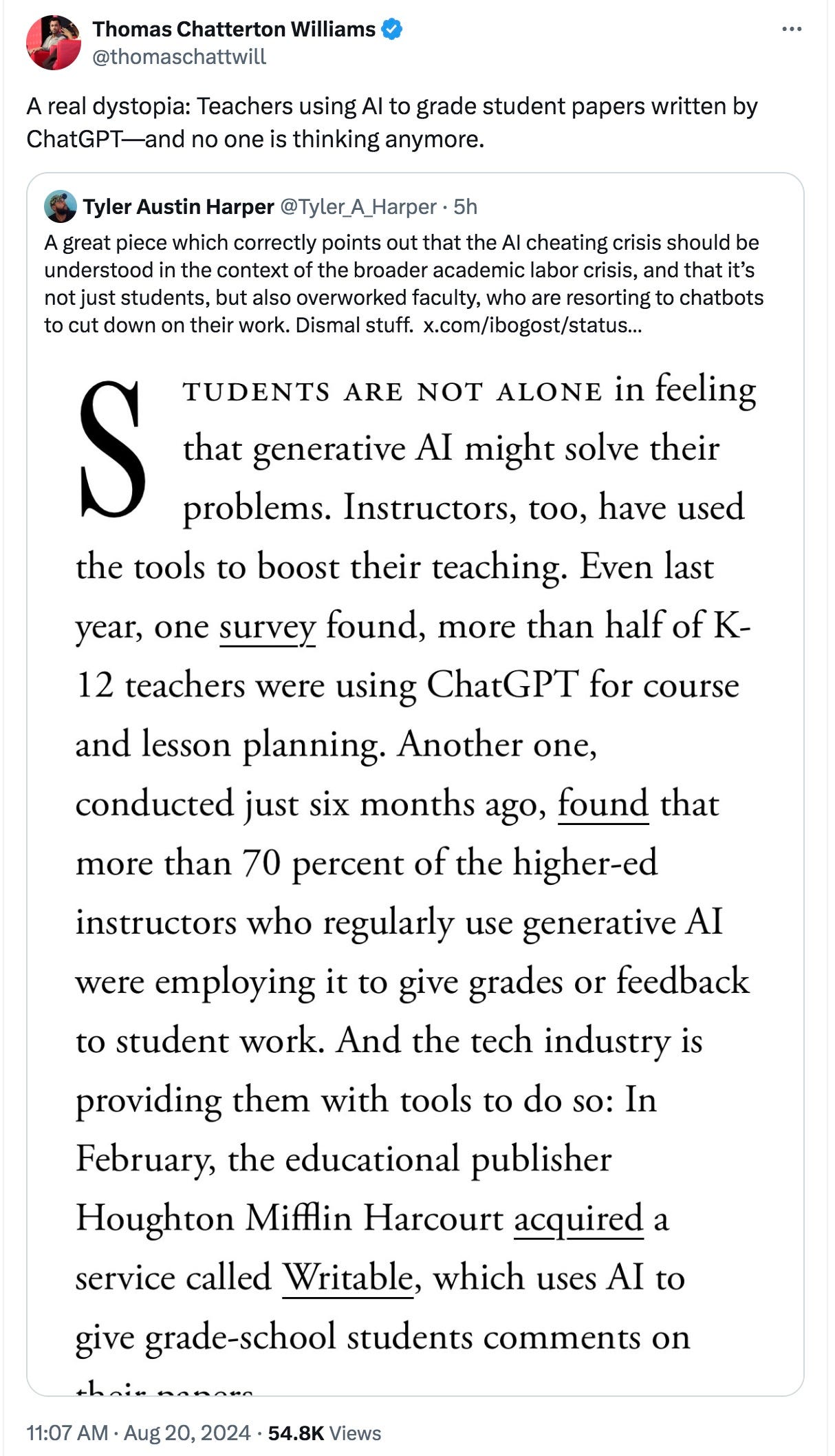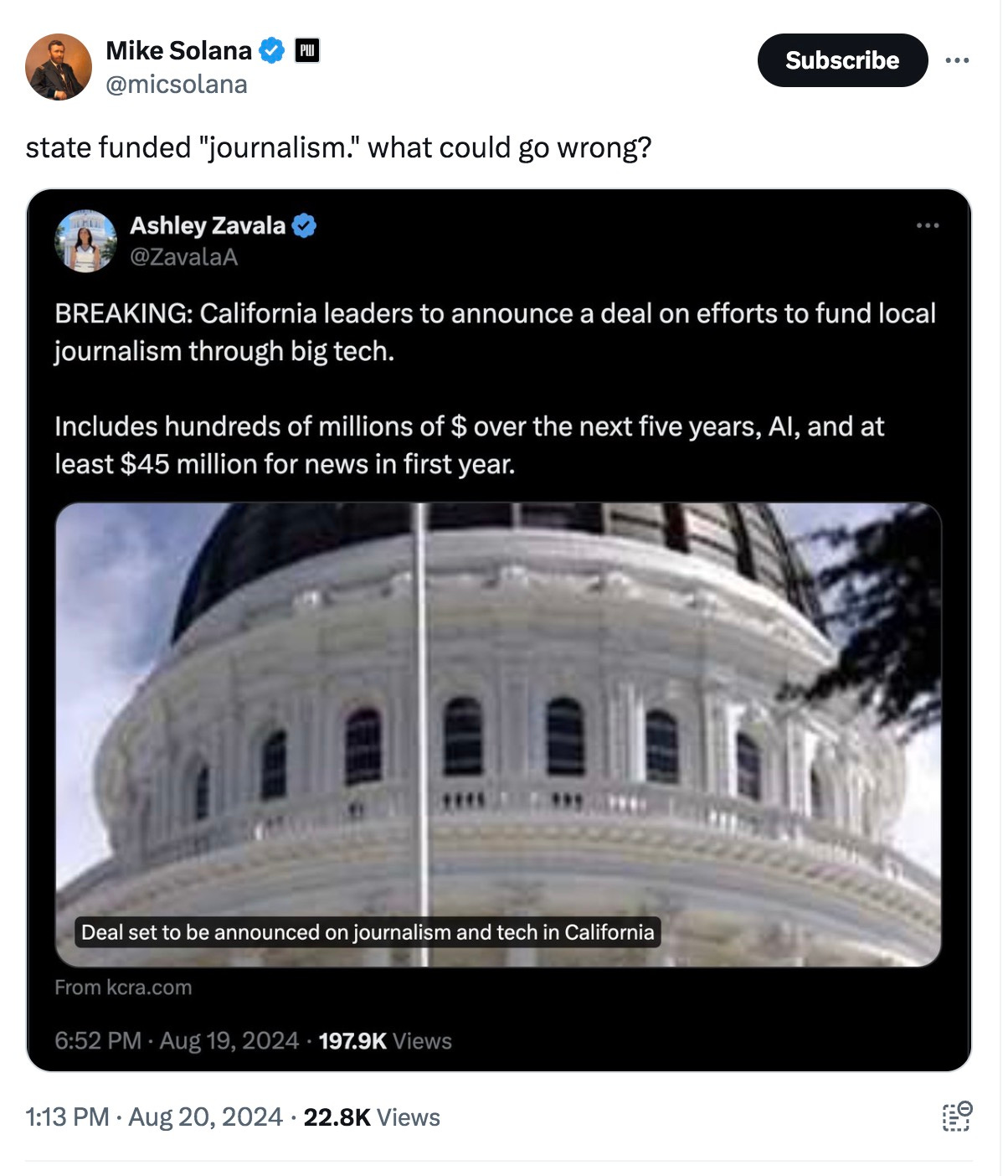E-Pluribus | August 20, 2024
Is 'colorblindness' good? It's not so black and white; Germany tries a novelist for wrong think (twice); and privilege as a consideration in hiring.
A round-up of the latest and best musings on the rise of illiberalism in the public discourse:
Glenn Loury, John McWhorter and Coleman Hughes: Colorblindness in the Public and Private Sphere
Martin Luther King Jr’s aspiration that his children “not be judged by the color of their skin but by the content of their character” hardly seems controversial today. But the concept of “colorblindness” tied to King’s famous words is anything but universally accepted. On Glenn Loury’s podcast, Loury, John McWhorter and Coleman Hughes recently discussed the concept and how it should apply in public and private spheres.
GLENN LOURY: Coleman Hughes’s book, The End of Race Politics: Arguments for a Colorblind America, has provoked a lot of discussion here and elsewhere. Though I have all the respect in the world for Coleman and his ideas, and I think his prominence is a net good for our racial discourse, I have some misgivings about his argument. Some of these misgivings, I have no trouble admitting, derive from my own particular history, upbringing, and social and intellectual development.
[. . .]
LOURY: What about the distinction between colorblindness in law and policy and government action, on the one hand, and colorblindness in terms of personal affiliation, choice of intimate partner, identity in terms of how I narrate the history of “my people” and all of that? Do you find that to be an at all useful distinction?
COLEMAN HUGHES: Absolutely it's a useful distinction. I think that if you are a person that says, “Look, I agree with you that there should be no race as a category on which to base social policy. But in my own life, I'm black or I'm Korean or I'm Jewish, and I, to be perfectly honest, prefer to be with my own. I am going to marry someone that is of my culture. Most of my friends are of my culture. I have nothing against other cultures, but it's where I feel comfortable and it gives me an identity. It gives me a story. And this is the story of my people, and it has meaning for me,” I think that there's not much I can say to such a person, because they agree that it should be kept out of the public sphere in a way that it should be kept out of public policy and should be a private thing.
If I go to a deli in Harlem, and everyone working at the deli is Yemeni, they're not hiring colorblind. Do I have a problem with the Yemeni deli owner that only wants to associate with other Yemenis? No, not really. Personally, I live a pretty cosmopolitan life, and I would defend the cosmopolitan life in the sense of, I have friends of every race, and I like that.
I like that I'm open to having friends of every race and associating from a place of “Coleman as an individual” as opposed to “Coleman, a raced person.”
JOHN MCWHORTER: I don't think that's the human default, though, Coleman.
COLEMAN HUGHES: That's right, I don't think it's the human default, and I don't judge as immoral the people that have a strong attachment. What I would want them to do is observe the distinction that you just made. It's fine for you to have that in your own life, but let's draw a bright line between your personal, private decisions and private values and what should be included in public policy.
JOHN MCWHORTER: Suppose they're white, is the question. Suppose a white person says, “I like my people.”
COLEMAN HUGHES: Look, to be consistent, if they're living their own life and not insisting that there be pro-white public policies, how are they hurting me?
Read it all here.
John Mac Ghlionn: The American Author Living An Orwellian Nightmare
As if the trial of C.J. Hopkins in Germany for his speech were not Orwellian enough, the prosecutor, stung by Hopkins initial acquittal, has decided to try him again — and the court has agreed. At Discourse Magazine, John Mac Ghlionn tells the cautionary tale.
C.J. Hopkins has spent his career exposing Orwellian scenarios through his writing, only to find himself living one. A celebrated playwright, novelist and political satirist, the acclaimed American writer has lived in Berlin since 2004, becoming renowned for his sharp critiques of modern politics, government overreach and mass surveillance. His latest book, “The Rise of the New Normal Reich,” exposes the authoritarian drift in global politics, from pandemic-era lockdowns to the suppression of dissenting voices.
Now, somewhat cruelly, the city that once inspired his creativity has become the crucible of his persecution.
The sexagenarian’s troubles started innocuously enough: He posted a series of tweets in August 2022 criticizing COVID-19 mask mandates as “symbols of ideological conformity.” His comparison of modern Germany to the Nazi era ignited a firestorm, prompting an investigation by the Interior Ministry of the Federal State of Hessen, followed by a criminal probe by German authorities. What ensued was a relentless campaign to not only silence him but also to destroy his reputation, extending beyond Germany to Austria and the Netherlands.
His audacity to speak out resulted in book bans, a criminal trial and a media frenzy. Despite his initial acquittal, the Berlin district prosecutor, dissatisfied with the verdict, has appealed the decision. This has resulted in a retrial, which began this week before the Berlin-Schöneberg Chamber of Commerce.
Many Americans might view Hopkins’ story as a peculiarly German or European example of persecution—and prosecution—of free speech, but Hopkins himself counters this notion. “My case,” he insists, “is just one of countless examples of the criminalization of dissent that is being rolled out worldwide. My story isn’t about the difference between German and American free speech protections. It is about the German authorities prosecuting government critics like me on blatantly fabricated charges.” He warns that “once a government starts doing that, the protections in its constitution no longer matter. You’re no longer dealing with questions of law. You are dealing with the exercise of authoritarian power.”
Like other satirists, Hopkins is a gadfly who often espouses what many might consider unorthodox ideas. For instance, he contends that his experiences are indicative of a larger, global shift—a movement toward a more authoritarian or totalitarian form of global capitalism since 2016. This transition, he argues, affects various regions around the world, including the EU, the U.S., Russia and, of course, China.
Read it all.
Kwame Anthony Appiah: I’m Choosing Which Interns Will Get Job Offers. Do I Take Privilege Into Account?
The New York Times’ “Ethicist” was recently asked about how “privilege” should figure into hiring decisions. Some of the observations Kwame Appiah makes about privilege in forming his answer may sound less than convincing to those who believe advancement should be based on merit.
Letter to the Ethicist: I manage the summer-intern program for my team at a major global financial institution. Together with two other colleagues, I decide to whom we wish to offer full-time positions at the end of the term. Our interns come from an array of socioeconomic and academic backgrounds and perform their duties with varying degrees of skill. Those coming from more well-to-do backgrounds appear to be performing better than those who come from less privileged backgrounds. When providing our final evaluations and ranking these interns, should we take their personal life circumstances into consideration? Or must we evaluate interns solely on job performance? We have been given no guidance on this from our program management. — Name Withheld
From the Ethicist:
We live in a class society. People who are rich in financial terms tend to be rich in cultural and social capital too: They have social assets, resources and connections. All these forms of advantage can contribute to an employee’s actual performance. But they can also contribute to the employee’s perceived performance. People often make judgments about the intelligence of speakers on the basis of their accents, for example, and one form of cultural capital is having the accent of the white, educated, Northern-coastal, middle classes.
So you can ask yourself whether your judgment about which of these interns is doing best has been shaped by features that don’t reflect the contribution they’re likely to make. You’re obviously alert to this possibility, because you write that the more privileged interns “appear” to be performing better; it’s worth thinking about whether you can identify evaluative measures that are less subject to this kind of bias. But another question is what weight to give to the fact that the objective contributions of the less privileged interns are made, to some extent, in spite of their disadvantages.
There are at least three considerations here. One has to do with what your interns’ current performance shows about their future performance. You might think, for example, that the more privileged interns who are doing well are drawing on resources — the kind provided by their family and their university — that will be less available to them as they continue with the firm. The less privileged interns, not having had so much to rely on, may be able to perform better in the future because they have less support to lose. A second consideration involves the possibility that — as some social scientists have argued — groups with members from a variety of backgrounds tend to be better at problem-solving than groups whose backgrounds are relatively homogeneous. If you advantage the already advantaged, your firm will be more upper-middle class and less diverse. The third consideration, as you’ll have anticipated, has to do with the role of decisions like yours in perpetuating social inequality. Simply advancing those who are doing best in part because of their privilege reinforces the unfairness from which they are already benefiting.
[. . .]
Plenty of people think, of course, that our society should be meritocratic, in the sense that its rewards should relate to individual talent and effort, rather than, say, parental resources. My own view is that most debates about meritocracy are confused. Talent and effort are both things that arise not just from our innate capacities but also from our circumstances; it’s muddled to suppose that talent and effort can be contrasted with parental inputs. Some people work hard in part because they were raised in ways that made it likelier that they would want to work hard. Your well-honed musical or athletic skills may have arisen, in part, because your parents invested in developing them long before you yourself had any ambitions. Once again, hierarchies have a way of reproducing themselves.
Read the whole thing.
Around Twitter (X)
Here’s Jacob Mchangama with a convoluted tale of the UK’s war on free speech. Click for the whole thread.
Thomas Chatterton Williams makes a dystopian science fiction observation regarding an Atlantic article quoted by Tyler Harper:
And finally, Mike Solana is not sanguine about California’s latest idea:









